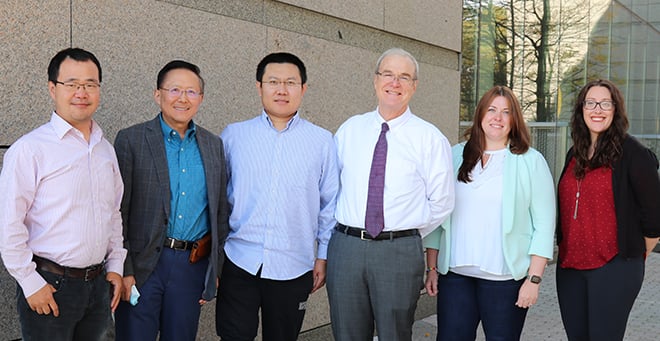Researchers from UMass Chan Medical School have received a five-year, $13.6 million program project grant from the National Heart, Lung and Blood Institute to develop new gene therapy models for alpha-1 antitrypsin (AAT) deficiency, a chronic, debilitating genetic lung disease that shortens the lifespan.

Dan Wang, PhD; Terence Flotte, MD; Allison Keeler-Klunk, PhD;
and Alisha Gruntman, DVM, PhD.
Individuals with AAT deficiency, an inherited genetic defect that results in severe loss of lung function, can be especially vulnerable to infections or irritants in the air and often develop life-threatening diseases such as emphysema or chronic obstructive pulmonary disease. The mutant gene that causes AAT deficiency has also been linked to cirrhosis of the liver.
Terence R. Flotte, MD, the Celia and Isaac Haidak Professor, executive deputy chancellor, provost and dean of the T.H. Chan School of Medicine, who leads the research team, said that while this program project grant targets AAT deficiency, the models could apply to other genetic diseases.
“Alpha-1 antitrypsin is an example of one genetic disease that we can really get our hands around from a biology standpoint and a clinical standpoint,” Dr. Flotte said. “But we’re hoping to have lessons learned about using viral vectors to deliver the gene, gene editing and immune modulation that could translate more broadly.”
He cited, for example, the focus on taming breakthrough immune suppression in clinical gene therapy research on Tay-Sachs and Sandhoff diseases.
The Flotte lab has received NIH funding to develop therapies for AAT deficiency since 1998, but, “It’s proved to be an elusive target to get to a truly effective gene therapy,” Flotte said.
Three main issues have impeded progress, according to Flotte.
Number one is getting the levels of the replacement gene high enough.
“We’re trying to replace a protein that is the second-most abundant circulating plasma protein—second only to albumin,” he said.
Researchers are exploring different approaches that don’t just rely on adeno-associated virus (AAV) vectors to deliver the therapy, but also include combinations with new AAV variants and therapies developed using the gene-editing CRISPR/Cas9 tool, a method only available in recent years.
“We’ve pulled in a number of young investigators who are experts in this process. That’s been really beneficial to the process,” said Flotte.
The second challenge is identifying additional clinically relevant endpoints to evaluate the gene therapy’s outcomes. According to Flotte, endpoints that relate to pulmonary function are highly variable, and in clinical trials with a rare disease such as AAT deficiency, those numbers alone can fall short.
“We’re looking at first, how can we get the [gene therapy] to high enough levels and how can we measure that endpoint in more clinically useful ways?” said Flotte.
The third target of the new research is an approach to modify immune response more precisely, so the body doesn’t reject the gene vector or overreact in a negative way. Researchers are using another newer form of immune modulation through CAR T cell technology.
“Taming the immune response is a key to both better efficacy and better safety,” said Flotte.
The current studies are being done on animal models, some of which were developed with partners at the University of Iowa.
“Interestingly, we’ve been to the clinic [trials] over the past years effectively four different times in different ways, because of the two phases,” Flotte said. “We’re trying to get better models, better vectors and better outcome measures.”
While the path to develop safe and effective gene therapies for AAT deficiency has been tortuous, Flotte credited the UMass Chan team’s “dogged persistence” to find a cure.
“You really have a commitment not just to the science, but to your patients,” he said. “You’ve got to keep trying different approaches until you get something that does work, instead of just moving on to something that might be easier to target.”
Other principal investigators who are part of this program project grant include Wen Xue, PhD, associate professor of RNA therapeutics; Allison Keeler-Klunk, PhD, assistant professor of pediatrics; Dan Wang, PhD, assistant professor of RNA therapeutics; Alisha Gruntman, DVM, PhD, assistant professor of pediatrics; and Guangping Gao, PhD, the Penelope Booth Rockwell Professor in Biomedical Research, professor of microbiology & physiological systems, director of the Horae Gene Therapy Center and co-director of the Li Weibo Institute for Rare Diseases.
Related stories on UMassMed News:
UMMS establishes gene therapy collaborative research agreement with Pfizer
Terence Flotte elected to American Society of Gene & Cell Therapy leadership team
UMass Medical School scientists honored for gene therapy patent for alpha 1 antitrypsin deficiency
New gene editing approach for alpha-1 antitrypsin deficiency shows promise in UMMS study